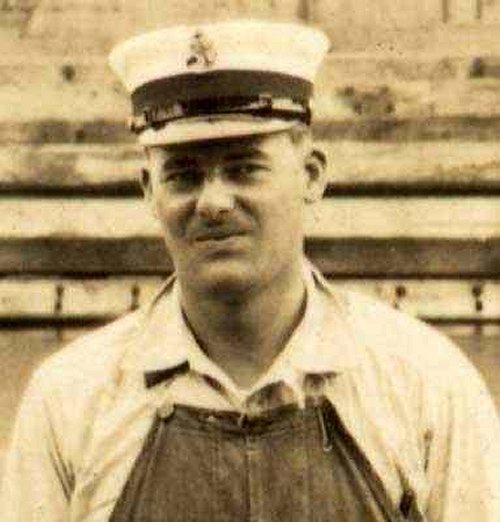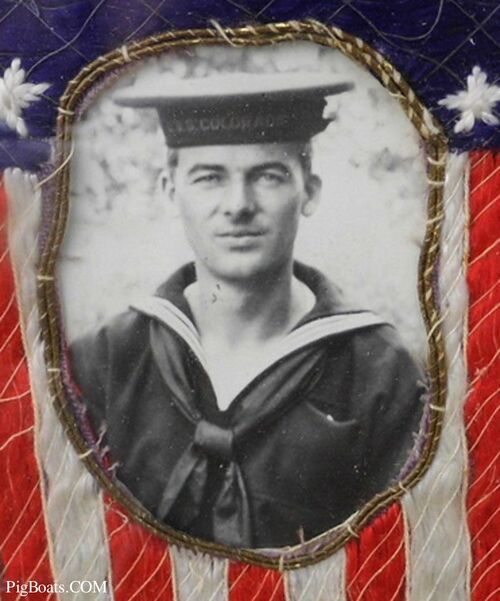Colwell: Difference between revisions
No edit summary |
Pbcjohnston (talk | contribs) Updated Navsource links |
||
| (5 intermediate revisions by the same user not shown) | |||
| Line 1: | Line 1: | ||
[[File:New Header 1 Men.jpg]] | |||
[[File:Header | |||
=== <big>Harley L. Colwell</big> === | |||
=== <big>Harley L Colwell</big> === | |||
<div style="text-align: justify;"><span style="color:#00008B"> | <div style="text-align: justify;"><span style="color:#00008B"> | ||
[[File:Harley L Colwell.jpg|left|500px|<center>Harley L Colwell as seen as a Chief Electrician aboard the USS F-4</center>]] | [[File:Harley L Colwell.jpg|left|500px|<center>Harley L. Colwell as seen as a Chief Electrician's Mate aboard the USS F-4</center>]] | ||
<div style="text-align: justify;"><span style="color:#00008B"> | <div style="text-align: justify;"><span style="color:#00008B"> | ||
Harley L Colwell was born in The Dalles, Oregon in May of 1888 to parents | Harley L. Colwell was born in The Dalles, Oregon in May of 1888 to parents James L. Colwell and Mary J. Colwell. James Colwell was a blacksmith and the family traveled a lot in the course of his job. It seems he worked mainly in mining and logging camps repairing and making tools and machinery for the camps. Harley had an older sister named Cecile who was two years older. Some reports about Mary Colwell say she was mixed-race heritage but this is refuted by others. | ||
At age 1 Harley was living with his family in Washington state and is included in the state's first census after it gained statehood in 1889. | |||
By 1910 the family in living in a small town in eastern Washington called Silver in the Methow Valley. The town of Silver no longer exists. It was a little over three miles north of the present town of Methow. They had moved there from Siwash in Okanogan County, another little mining town now just a name in history, farther to the east and north, also in Washington state. | |||
[[File:colwell banner closeup.jpg|left|500px|Harley L. Colwell as an Electrician's Mate 3rd Class aboard the USS Colorado (ACR-7)]]By the U.S. Census taken on the 28th of July, 1910 at Bremerton, Washington, Harley was in the Navy and stationed aboard the [https://www.navsource.net/archives/04/acr7/acr7.htm '''USS Colorado (Armored Cruiser No. 7)''']. By the time of this census the Colorado had returned from a tour in the Orient and Harley seems to have been aboard for that tour visiting China and the Philippines. He was 24 years old and an Electrician's Mate 3rd Class. He could have joined the Navy as early as 1904 when he turned 18. | |||
When Harley transferred to the submarine [[F-4|'''USS F-4 (Submarine No. 23)''']] is not known at this time. The four [[F-class|'''F-class''']] submarines were towed to Honolulu Harbor from San Francisco in the summer of 1914. The submarines operated out of Piers 5 and 5A in Honolulu Harbor that were leased from the City of Honolulu. There were no submarine facilities available at Pearl Harbor at that time, it was mainly a coaling station and repair station for the larger ships. | |||
The F-4 | The submarines conducted daily operations out of Honolulu Harbor, many times diving within the harbor itself and traveling out of the channel submerged. The F-4 did that on the morning of March 25, 1915 taking Harley Colwell and the rest of his shipmates out of the harbor. On the way out she passed the [[F-1|'''F-1 (Submarine No. 20)''']] on the surface entering the channel, fresh from her morning maneuvers. The F-4 turned her periscope to view her as they passed. The last person to see the F-4 was Ensign Harry Bogusch, the executive officer of the F-1. He was on deck and waved his hat to the periscope as the two passed. | ||
The F-4 continued to the operating area and began her drills but the submarine had a weakened hull from battery acid that had sloshed out of the lead lined battery well over time. It had been eating away at hull rivets and hull plating, weakening the submarine's hull. | |||
Harley Colwell would have been busy during the dive supervising his fellow electricians in chasing down ground faults and trying to keep his panels dry. The early riveted hulls were notorious for leaking around the seams until external pressure squeezed them tight. The hulls also sweated from engine heat condensing on the hull interiors and dripping everywhere. | |||
He might have been handling the port and starboard field rheostats and adjusting the two controller handles for the main propulsion motors at their station on the aft control room bulkhead, an area that was to evolve on later submarines into a whole separate space called the maneuvering room. | |||
On this dive Colwell was short one of his electricians. EM 3c James M. Hoggett was the designated man to stay ashore on this trip. Someone was usually left on the dock to be a point of contact and to watch the boat's gear while it was doing training. As it was, Hoggett was to be the only F-4 crewman to not die that day. He was to help in the salvage efforts. | |||
Harley | At some point the F-4's hull began to leak in the weakened area under the forward battery well and it could not be stopped. The extra weight dragged them deeper and deeper. The crew did all they could and tried to blow ballast in an attempt to get themselves to the surface. When that failed most of the crew, Harley included, moved into the engine room and dogged the door. As the submarine went deeper the water pressure imploded the hull on the port side of the battery compartment, near the torpedo room bulkhead. instantly flooding most of the boat. Water pressure quickly overcame the watertight door leading to the engine room and it failed, instantly flooding the space and killing the crew that had sought shelter there. | ||
His father was living in Seattle, Washington when he heard the news of his | Harley L. Colwell was 29 years old, single, and a Chief Electrician's Mate at that time. His father was living in Seattle, Washington when he heard the news of his son's death. | ||
Seventeen members of the crew were not able to be identified by the time the salvage operation was completed, Harley was one of that number. These men were placed in four caskets that were buried in a single grave | Seventeen members of the crew were not able to be identified by the time the salvage operation was completed, Harley was one of that number. These men were placed in four caskets that were buried in a single grave on October 23, 1915 with full military honors at Arlington National Cemetery, Plot: Sec: 2, Site: 3387.</div> | ||
[[File:Red bar sub new.jpg]] | [[File:Red bar sub new.jpg]] | ||
Latest revision as of 13:57, 18 June 2025
Harley L. Colwell

Harley L. Colwell was born in The Dalles, Oregon in May of 1888 to parents James L. Colwell and Mary J. Colwell. James Colwell was a blacksmith and the family traveled a lot in the course of his job. It seems he worked mainly in mining and logging camps repairing and making tools and machinery for the camps. Harley had an older sister named Cecile who was two years older. Some reports about Mary Colwell say she was mixed-race heritage but this is refuted by others.
At age 1 Harley was living with his family in Washington state and is included in the state's first census after it gained statehood in 1889.
By 1910 the family in living in a small town in eastern Washington called Silver in the Methow Valley. The town of Silver no longer exists. It was a little over three miles north of the present town of Methow. They had moved there from Siwash in Okanogan County, another little mining town now just a name in history, farther to the east and north, also in Washington state.

When Harley transferred to the submarine USS F-4 (Submarine No. 23) is not known at this time. The four F-class submarines were towed to Honolulu Harbor from San Francisco in the summer of 1914. The submarines operated out of Piers 5 and 5A in Honolulu Harbor that were leased from the City of Honolulu. There were no submarine facilities available at Pearl Harbor at that time, it was mainly a coaling station and repair station for the larger ships.
The submarines conducted daily operations out of Honolulu Harbor, many times diving within the harbor itself and traveling out of the channel submerged. The F-4 did that on the morning of March 25, 1915 taking Harley Colwell and the rest of his shipmates out of the harbor. On the way out she passed the F-1 (Submarine No. 20) on the surface entering the channel, fresh from her morning maneuvers. The F-4 turned her periscope to view her as they passed. The last person to see the F-4 was Ensign Harry Bogusch, the executive officer of the F-1. He was on deck and waved his hat to the periscope as the two passed.
The F-4 continued to the operating area and began her drills but the submarine had a weakened hull from battery acid that had sloshed out of the lead lined battery well over time. It had been eating away at hull rivets and hull plating, weakening the submarine's hull.
Harley Colwell would have been busy during the dive supervising his fellow electricians in chasing down ground faults and trying to keep his panels dry. The early riveted hulls were notorious for leaking around the seams until external pressure squeezed them tight. The hulls also sweated from engine heat condensing on the hull interiors and dripping everywhere.
He might have been handling the port and starboard field rheostats and adjusting the two controller handles for the main propulsion motors at their station on the aft control room bulkhead, an area that was to evolve on later submarines into a whole separate space called the maneuvering room.
On this dive Colwell was short one of his electricians. EM 3c James M. Hoggett was the designated man to stay ashore on this trip. Someone was usually left on the dock to be a point of contact and to watch the boat's gear while it was doing training. As it was, Hoggett was to be the only F-4 crewman to not die that day. He was to help in the salvage efforts.
At some point the F-4's hull began to leak in the weakened area under the forward battery well and it could not be stopped. The extra weight dragged them deeper and deeper. The crew did all they could and tried to blow ballast in an attempt to get themselves to the surface. When that failed most of the crew, Harley included, moved into the engine room and dogged the door. As the submarine went deeper the water pressure imploded the hull on the port side of the battery compartment, near the torpedo room bulkhead. instantly flooding most of the boat. Water pressure quickly overcame the watertight door leading to the engine room and it failed, instantly flooding the space and killing the crew that had sought shelter there.
Harley L. Colwell was 29 years old, single, and a Chief Electrician's Mate at that time. His father was living in Seattle, Washington when he heard the news of his son's death.
Seventeen members of the crew were not able to be identified by the time the salvage operation was completed, Harley was one of that number. These men were placed in four caskets that were buried in a single grave on October 23, 1915 with full military honors at Arlington National Cemetery, Plot: Sec: 2, Site: 3387.
Page created by:
Ric Hedman & David Johnston
1999 - 2023 - PigBoats.COM©
Mountlake Terrace, WA, Norfolk, VA
webmaster at pigboats dot com
